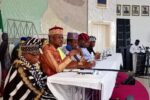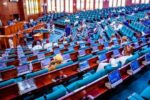Defections Increases APC Members to 68 in Senate and 207 in House of Reps

The ruling All Progressives Congress (APC) now has 68 Senators and 207 House of Representatives following defections from opposition parties.
This is coming less than two years into the 10th Assembly.
The APC currently holds 68 seats in the Senate and approximately 207 in the House of Representatives, marking an increase from the party’s initial numbers at the inauguration of the current legislative session in June 2023. This figure is expected to rise to 69 on June 12 when Senator Neda Imasuen of the Labour Party, representing Edo South, is scheduled to formally defect to the ruling party.
Another potential defection could raise the APC’s Senate strength to 70, as Senator Ahmed Wadada Aliyu of Nasarawa West, who recently resigned from the Social Democratic Party (SDP), is widely speculated to be rejoining the APC.
PDP which initially had a stronger presence in the House and was nearly on par with the APC in the Senate, has seen its numbers dwindle sharply. At the start of the 10th Assembly, the Senate comprised 59 APC members, 36 from the Peoples Democratic Party (PDP), eight from the Labour Party (LP), and others from minor parties. Following the string of defections, the Senate now stands at: APC – 68; PDP – 30; LP – 5; SDP – 2; NNPP – 1; APGA – 1; with two seats, one each in Edo and Anambra, currently vacant.
In the House of Representatives, the APC began with 175 seats, while opposition parties collectively held 182. That balance has since shifted significantly in favour of the ruling party, which now boasts around 207 seats. The PDP and other opposition parties have seen a combined drop to approximately 150 seats.
A series of high-profile defections has marked the Senate’s shift. These include Senator Ibrahim Danbaba (Sokoto South, PDP) in March 2024; Senator Ifeanyi Ubah (YPP, Anambra South) in October 2023; Senator Ned Nwoko (Delta North, PDP) in February 2025; Senator Ezenwa Onyewuchi (Imo East, LP) in July 2024; and Senator Kawu Sumaila (Kano South, NNPP) in May 2025. The recent switch of three senators from Kebbi, Adamu Aliero, Yahaya Abdullahi, and Garba Maidoki, from the PDP to the APC followed a meeting with President Bola Tinubu at the Presidential Villa.
In the House of Representatives, defections have come in waves. Beginning with Hon. Idris Salman (Kabba-Bunu/Ijumu, Kogi) who left the ADC for the APC in July 2024, the trend intensified in the following months. Notable PDP defectors include Hon. Chris Nkwonta (Abia), Hon. Sulaiman Abubakar (Zamfara), Hon. Amos Magaji (Kaduna), Hon. Garba Koko (Kebbi), Hon. Jallo Hussaini Mohammed (Kaduna), Hon. Adamu Tanko (Niger), and Hon. Oluwole Oke (Osun).
The Labour Party, which had a strong showing in the 2023 elections, has suffered multiple defections. On December 5, 2024, four LP lawmakers defected to the APC, followed by others including Hon. Alfred Ajang (Plateau), Hon. Obetta Chidi and Hon. Dennis Agbo (Enugu), and most recently Hon. Sunday Umeha (Enugu) on May 22, 2025.
In Delta State, the defection of six PDP lawmakers to the APC on May 6 followed the move by the state governor, Sheriff Oborevwori, highlighting the influence of state-level dynamics on the federal legislature. On that same day, two LP lawmakers from Enugu defected to the PDP, reflecting the broader volatility within opposition ranks.
The NNPP has also lost ground, with Hon. Kabiru Usman and Hon. Abdullahi Sani joining the APC on May 15. That same day, the PDP’s representation further declined with the defection of Hon. Oluwole Oke from Osun.
Observers suggest that more realignments are likely when the National Assembly resumes from recess, particularly in Akwa Ibom where Governor Umo Eno’s recent defection from the PDP could influence federal lawmakers from the state. Akwa Ibom currently has two PDP senators and seven PDP House members.





